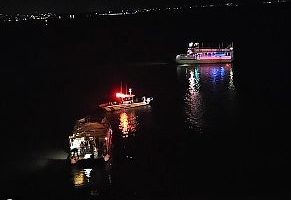Rescue crews plumbing the depths of the Atlantic for the Titan submersible which was lost sunday with five people aboard will get assistance from the Victor 6000 robot — a highly advanced deep sea craft and one of the few vessels on Earth capable of reaching the wreck.
The Victor 6000 is currently being rushed to the search site aboard a French research vessel, but is not expected to arrive until Wednesday evening EST — around 12 hours before the oxygen supply on the missing submersible is expected to run out Thursday.
A 10 foot long remote-controlled robot with a bright yellow back, the Victor 6000 has been described as “flagship device for underwater operations,” according to the French network BMTV, and is capable of reaching a depth of 6,000 meters, equivalent to 20,000 feet.
With the Titanic lying 12,500 feet beneath the waves on the ocean floor, the craft should be more than capable of reaching it wreck.


It is also equipped with a robotic arm, which could be used for dislodging the lost Titan submersible if it is discovered trapped within the Titanic wreckage, or could attach a tether to pull the vessel to safety with the help of a surface ship.
“Victor is not capable of lifting the submarine up on its own,” Olivier Lefort from the French state run oceanic research institute, Ifremer, told Reuters.
“Victor is able to do visual exploration with all the video equipment it has. It is also equipped with manipulating arms which could be used to extricate the sub, such as by sectioning cables or things that would be blocking it at the bottom,” he said.
But with no time to spare, in order for the robot to pull off a rescue, crews already on the site would likely need to locate the missing submersible before the Victor 6000 arrives.
Read Related Also: AFT boss Randi Weingarten questioned language in school reopening plan in chummy exchange with CDC chief, texts show
Lefort said the U.S. Navy reached out to Ifremer requesting help, and that the organization — where one of the five missing crew members, Paul-Henri Nargeolet, 77, previously worked — could not say no.
“This is the logic of seafarers. Our attitude was: We are close, we have to go,” he said.

Victor 6000 is operated by a 25-person crew onboard its mothership, the Atalante, all of whom are speeding to the search site with the hope of pulling of a miracle.
“We can work non-stop for up to 72 hours, we don’t need to stop at night,” Lefort told Reuters.
Aircraft from the U.S and Canadian Coast Guards recently picked up on repetitive knocking noises emanating from the deep in the vicinity of where surface crews lost contact with the Titan on Sunday.
It is believed the sounds could be coming from the stranded passengers hammering on the hull of their submersible to signal the surface.
“We don’t know what happened. The noises that were heard give us hope the submarine is on the seabed and that people are still alive, but other scenarios are possible,” said Lefort.
“Even if hope is slim, we’ll go all the way.”








